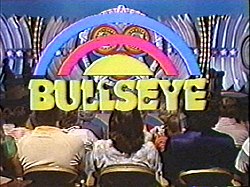Bullseye (U.S. game show)
| (Celebrity) Bullseye | |
|---|---|
 |
|
| Created by | Jack Barry & Dan Enright |
| Presented by | Jim Lange |
| Narrated by |
Jay Stewart Charlie O'Donnell |
| Theme music composer | Hal Hidey |
| Country of origin |
|
| No. of episodes | 390 |
| Production | |
| Location(s) |
NBC Studios Burbank, California (1980–1981) CBS Television City Hollywood, California (1981–1982) |
| Running time | 30 Minutes |
| Production company(s) | Barry & Enright Productions |
| Distributor | Colbert Television Sales |
| Release | |
| Original network | Syndicated |
| Original release | September 29, 1980 – September 24, 1982 |
Bullseye is an American game show that aired in syndication from September 29, 1980 to September 24, 1982. Jim Lange was the host, and the program was produced by Jack Barry and Dan Enright. Jay Stewart was the announcer for the first season, and Charlie O'Donnell announced for the second season. The series' executive producer was Ron Greenberg.
Two contestants, one a returning champion, competed. The game began with the champion stopping three spinning windows, set up in a triangular fashion, by hitting a plunger in front of him/her. The top two windows contained eight different categories—four in each window—with dollar amounts ranging from $50 to $200, representing the value of each question in the category. The bottom window was the contract window, and displayed numbers from one to five as well as a bullseye.
When the windows stopped spinning, the contestant chose either of the displayed categories, and had to fulfill the contract by correctly answering the number of questions indicated in the contract window. Each correct answer added the dollar value of the category to a pot. The bullseye represented an unlimited contract, which allowed the contestant who spun it to continue answering questions as long as he/she desired. If a contestant answered incorrectly at any point, the opponent was given a chance to take control of the contract with a right answer. An incorrect answer on a bullseye immediately ended the contract, but the opponent could still take control by giving the correct response. If both contestants missed the same question, it was thrown out and control reverted to the contestant who had originally tried to answer it. The contestant who completed the contract could choose to bank the money in the pot and give up control of the next spin to the opponent, or leave the money in the pot and spin again.
Originally, the first contestant to bank $1,000 or more won the game. During the two-week period of November 24 to December 5, 1980, the same amount won by a champion in the main game would also be donated to a children's charity. To ensure the charities would receive more money, the question values were doubled to $100 to $400, with a total of $2,000 or more needed to win, and these increased amounts remained in place for the rest of the series.
...
Wikipedia
